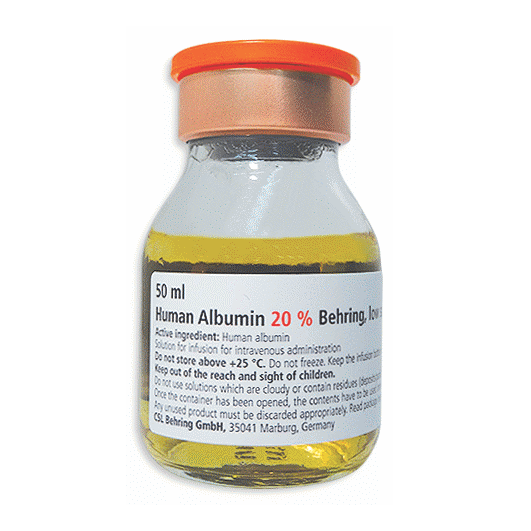Human Albumin Uses, Dosage, Side Effects and more
Human albumin increases intravascular oncotic pressure and causes movement of fluids from interstitial into intravascular space. Human albumin solutions are available in various concentrations. Solutions containing 5% human albumin are usually used in hypovolemic patients, whereas more concentrated 25% solutions are recommended in patients in whom fluid and sodium intake must be minimised e.g. patients with hypoproteinaemia or cerebral oedema or in paediatric patients.

| Attribute | Details |
|---|---|
| Trade Name | Human Albumin |
| Generic | Human Albumin |
| Weight | 20%w/v, 20%, 200g/l, 5%, |
| Type | Infusion, Injection, Iv Infusion, Solution |
| Therapeutic Class | Plasma expanders |
| Manufacturer | Baxter India Pvt Ltd, The Eastern Trade & Distribution Co, (pvt) Ltd,, Csl Behring, U,s,a,, City Overseas Ltd, Octapharma, Biotest, Human Bioplazma Llc, Paviour Pharmaceuticals Pvt Ltd |
| Available Country | India, Pakistan, Bangladesh, Saudi Arabia, Indonesia |
| Last Updated: | January 7, 2025 at 1:49 am |
Uses
Shock: Albumin is used for the emergency treatment of shock and in other similar conditions where the restoration of blood volume is urgent. If there has been considerable loss of red blood cells, transfusion with packed red blood cells is used.
Burns: Albumin or Albumin in either normal saline or dextrose is used to prevent marked hemoconcentration and to maintain appropriate electrolyte balance.
Hypoproteinemia with or without edema: Albumin is used for those clinical situations usually associated with a low concentration of plasma protein and a resulting decreased circulating blood volume. Although diuresis may occur soon after albumin administration has been instituted, best results are obtained if albumin is continued until the normal serum protein level is regained.
Dosage
Albumin (Human) 25% may be given intravenously without dilution or it may be diluted with normal saline or 5% dextrose before administration. 200 mL per liter gives a solution which is approximately isotonic and iso-osmotic with citrated plasma.
When undiluted albumin solution is administered in patients with normal blood volume, the rate of infusion should be slow enough (1 mL per minute) to prevent too rapid expansion of plasma volume.
In the treatment of shock the amount of albumin and duration oftherapymust be based on the responsiveness of the patient as indicated byblood pressure, degree of pulmonary congestion, andhematocrit. The initial dose may be followed by additional albumin within 15-30 minutes if the response is deemed inadequate. If there is continued loss of protein, it may be desirable to give packed red blood cells.
In the treatment of burns an optimalregimeninvolving use of albumin, crystalloids, electrolytes and water has not been established. Suggested therapy during the first 24 hours includes administration of large volumes of crystalloid solution to maintain an adequate plasma volume. Continuation of therapy beyond 24 hours usually requires more albumin and less crystalloid solution to prevent marked hemoconcentration and maintain electrolyte balance. Duration of treatment varies depending upon the extent of protein loss through renal excretion, denuded areas of skin and decreased albumin synthesis. Attempts to raise the albumin level above 4.0 g/100 mL may only result in an increased rate ofcatabolism.
In the treatment of hypoproteinemia, 200 to 300 mL of 25% albumin may be required to reduce edema and to bring serum protein values to normal. Since such patients usually have approximately normal blood volume, doses of more than 100 mL of 25% albumin should not be given faster than 100 mL in 30 to 45 minutes to avoid circulatory embarrassment. If slower administration is desired, 200 mL of 25% albumin may be mixed with 300 mL of 10% dextrose solution and administered by continuous drip at a rate of 100 mL of this dextrose solution an hour.
Parenteral drug products should be inspected visually for particulate matter and discoloration prior to administration, whenever solution and container permit.
How Long Does It Take to Work?
How Long Does It Take to Work? see here Human Albumin
Side Effects
Allergic or pyrogenic reactions are characterized primarily by fever and chills; rash, nausea, vomiting, tachycardia and hypotension have also been reported. Should an adverse reaction occur, slow or stop the infusion for a period of time which may result in the disappearance of the symptoms. If administration has been stopped and the patient requires additional Albumin (Human), material from a different lot should be used. Albumin (Human), particularly if administered rapidly, may result in vascular overload with resultant pulmonary edema.
Precaution
Hypertension or low cardiac reserve; additional fluids for dehydrated patients. Monitor for signs of cardiac overload in injured or postoperative patients. May carry risk of viral transmission. Volume admin and rate of infusion must always be individualised according to situation and response. Pregnancy, lactation.
Interaction
Albumin solution should not be mixed by protein hydrolysates or alcoholic solutions. Risk of atypical reactions to ACE inhibitors in patients undergoing therapeutic plasma exchange with albumin human replacement.
Pregnancy & Breastfeeding use
Pregnancy Category C. Either studies in animals have revealed adverse effects on the foetus (teratogenic or embryocidal or other) and there are no controlled studies in women or studies in women and animals are not available. Drugs should be given only if the potential benefit justifies the potential risk to the foetus.
Contraindication
Albumin (Human) may be contraindicated in patients with severe anemia or cardiac failure and in patients with a history of allergic reactions to human albumin.
Special Warning
Pediatric Use: No clinical studies using Albumin (Human) 25%, have been conducted in pediatric patients. Safety and effectiveness in pediatric patients have not been established. However, extensive experience in patients suggests that children respond to Albumin (Human) 25%, in the same manner as adults.
Storage Condition
Store below 30°C. Do not freeze.



